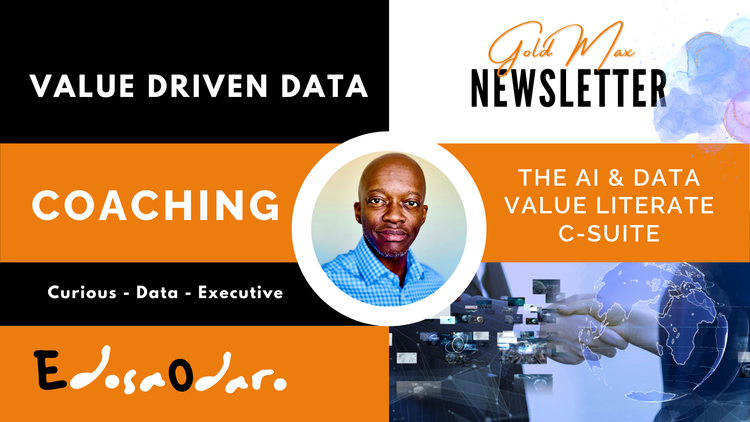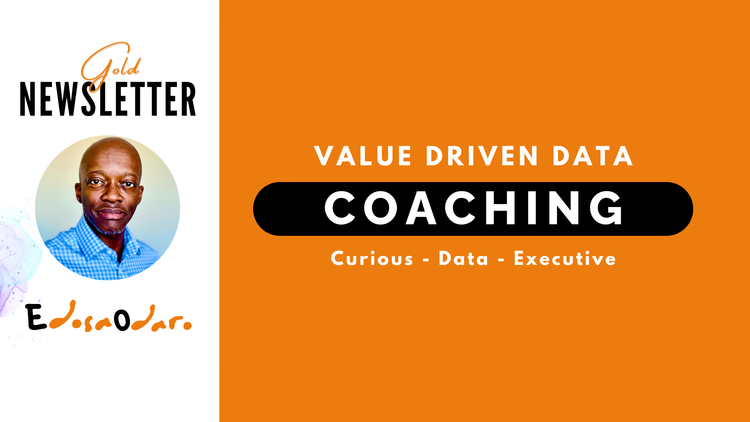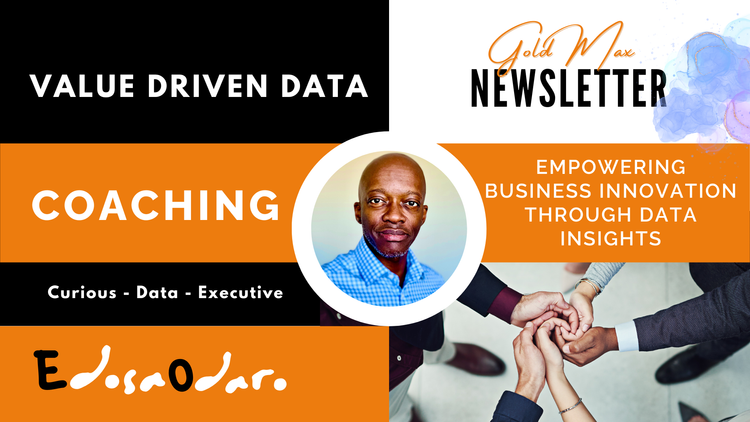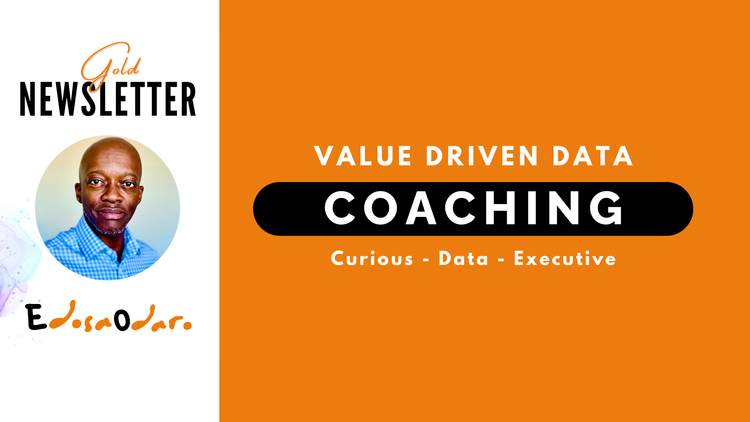Model of the Month - with Tim Carmichael
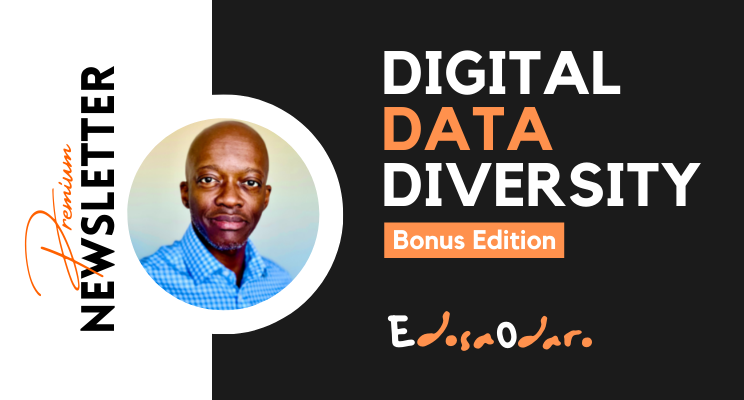
Model of the Month
Personal Professional Practical - Inspirational Insightful Ideas
Why do we encounter so much resistance to change even when such change could seem beneficial. This month's premium edition explored this challenge and offered a tangible step-wise approach to resolving such situations.
Beyond this, today's bonus edition delivers our first "Model of the Month" interview with deep and helpful insights from an accomplished professional who has become notorious for reinventing his career - Tim Carmichael.
As always, this premium newsletter concludes by providing direct access to my calendar with current availability throughout this month and offers other ways to get in direct contact.
Tim Carmichael
The Profile
Today, we are privileged to be joined by Tim Carmichael.
Tim is currently leading an amazing data team that is helping Chalhoub Group - world renowned premium jewellery and luxury brand - accelerate their data transformation, create value and find even more ways to delight their wonderful customers.
Tim embodies the fundamentals of a growth mindset and describes himself by what he learns. Most recently, he has learnt that, as a Data Leader:
1. It's not just about data, it's about culture too. Many business areas are concerned that being "data-driven" is a leap of faith that supplants business leaders' hard-earned judgement. The trick is to turn the conversation into one where data moves to the heart of their business; they don't have to relinquish ownership to see how harnessing data can be transformational.
2. Keeping the message simple and compelling is vital. He has added most value as both evangelist and interpreter. Being passionate about the role of data throughout the organisation needs to be coupled with the communications skill to be equally fluent on both sides of the business user - technical provider divide. Otherwise there's only a dialogue of the deaf.
3. Data is most relevant when it is exploited to generate business value. Without a clear link between benefits and underpinning data, any data effort will just look like a cost centre.
Getting Personal
with Tim Carmichael
In today's interview, we dive straight into Tim's personal experiences by employing a mix of quick fires and provocative questioning to ensure great flow without losing the opportunity to gain helpful substance. It starts by getting straight into the sophisticated interactions between Tim's personal and work lives.
It exposes revealing insights - including the significance of the stark difference between Saturday mornings and Sunday evenings, Tim's goto source of knowledge, a choice between traditional paperbacks and tech apps, and addressing the trending controversial debates that pitch Man against Machine.
Getting Personal - The Transcripts
Edosa:
Okay. So, let's jump into the meat of it. So, we start with some quick fire and really starting with the personal and just breaking the ice.
So, sausage or salad?
Tim:
Salad.
Edosa:
Okay. Pizza or pasta?
Tim:
Pasta.
Edosa:
Okay. Smoothies or shots?
Tim:
Short!
Edosa:
Okay. There was a bit of a hesitation there. Sparkling or still?
Tim:
Sparkling.
Edosa:
Okay, cool. Keeping on the kick quick fire. This one actually shift away from food and drink and a bit towards the work life side of things.
Okay. Life before or life after COVID?
Tim:
Life after - no point in looking back.
Edosa:
Okay. Working from home or working from an office?
Tim:
Both - balance to all times.
Edosa:
Okay. Physical meetings or virtual?
Tim:
Both. They're both parts of our new reality.
Edosa:
Sounds like a bit of sitting on the fence going on. I think with this one it might be hard to sit on fence as it is quite binary.
So, Mondays or Fridays?
Tim:
Mondays.
Edosa:
Ok, there you go.
Tim:
There's so much to look forward to in my week!
Edosa:
Ok, I like that. I really like that.
Okay. We're sticking with life. This is a life work if you like. So how life actually comes into work. Here, this is really trying to dig into what you do and how that affects your work.
So, how do you spend your Saturday mornings?
Tim:
Cycling? Over here in Dubai, there is some amazing cycling in the desert, which is a different kind of space and place to cycle in.
Edosa:
Wow. That sounds incredible!
But how would you spend your ideal Saturday morning? This is trying to pull out whether what you're doing really isn't quite the ideal.
Tim:
I'd be cycling, but with my buddies from England, I've got a great bunch of cycling buddies I cycle with when I'm back in the UK and it would be really cool to have them out here to share that experience with.
Edosa:
Brilliant. Okay. This one might a bit of a tricky one. How do you spend your Sunday evenings?
Tim:
Normally, sadly, preparing for the wonderful Monday so that I can be the best I can be.
Edosa:
And following on from that. How would you, ideally, spend your ideal Sunday evenings?
Tim:
Alongside my wife, glass of wine, gentle music, nothing to do with work. You see how those don't overlap? My reality and my aspiration.
Edosa:
Indeed. That's what that's trying to pull out actually. Okay. So, you already talked about your cycling, but this is a bit of quick fire around wellbeing. So, exercise or diet?
Tim:
Exercise.
Edosa:
Okay. What do you do to decompress?
Tim:
I cook. So I go back to diet.
Edosa:
Oh, very nice!
Tim:
One thing that I've always had between my work life and my home life is the act of commuting and the act of arrival at home - and I soften all of that by cooking. When I get home, it's my way of decompressing and contributing.
Edosa:
Oh, that sounds brilliant. Okay. More quick fire. Cycle or car? I think I know the answer.
Tim:
Cycle.
Edosa:
Yes. Okay. What would you bring on a one way trip to Mars?
Tim:
A reasonable stock of food, water, and shelter. Those basic Maslow needs.
Edosa:
Very, very practical, Tim. Okay. This now shifts us towards knowledge now. And after this, we're going to go into the professional side of things.
Tim:
Sure.
Edosa:
So, quick fire and then we'll jump into the meat of professional. So traditional paperbacks or tech apps?
Tim:
Tech apps.
Edosa:
Okay. Your goto source of knowledge?
Tim:
My network. I'm blessed to have a bunch of practitioners around me who really know their stuff. Some of those I work with now and some of those are my wider network and there's always someone who's got a better idea or answer than I have.
Edosa:
No, that's brilliant. Okay, this might be a tricky one. Creator or consumer?
Tim:
Creator.
Edosa:
Interesting.
Tim:
My job at the moment is working with a bunch of people who create data products that make a real difference for our business.
Edosa:
Interesting. Okay. This, this might be even trickier. Human versus machine?
Tim:
I can't do an OR on that. It's an effective partnership between both it's. It's both. Sorry.
Edosa:
Indeed. It is quite tricky.
Tim:
I can give you a better nuanced answer than that. If you had to make the decision between human and machine, it would always boil down to human for me - because that's where the intellectual property resides. That's where the creativity and the drive and the ambition resides. At the heart of any endeavour, such as ours, which have a, a technical and a data context, it's about people.
Edosa:
Indeed. It's not an easy one. It's either by people or for people.
Tim:
In some ways you can also think about it being with people.
Edosa:
Absolutely! Okay. That's the personal bit done.
Being Professional
What Work Does To You
How can we make things less complicated? Here, we jump into the professional. Here, Tim not only shares deep insights about how he makes things less complicated but also shares his professional journey with inspirational stories of his transition between roles and his acquisition of new competencies.
It is action packed with gripping stories from being rocketed of a rooftop in Basra, Iraq, to solving data forecasting and computational problems in the east African plains of Kenya.
Being Professional - What Work Does To You - The Transcripts
Edosa:
So, we're jumping actually now into the professional side of things. Okay. And, interestingly, of course, I personally know it very well, but we haven't actually talked about your profession. And so, what do you actually do. So, what is your occupation?
Tim:
I am a chief officer. Now, what does that mean? It means someone who for good or for bad reasons has found themselves in a position where they are held accountable for and are responsible for driving the data effort inside an organisation, getting the organisation to a place where it will routinely harness its data to do good things and typically to generate value - the kind of value that comes from insights being driven from that data or extracted from that data. That means that my profession as chief data officer is sometimes technical, often about business, always about people.
Edosa:
That's brilliant. I really like that answer. So, how long have you had this occupation for?
Tim:
Well, the first time I was a chief data officer was back in 2015. I've been doing this in different places for seven years, if I can do my sums, right. This is my third go at being a chief data officer or a chief analytics officer. And, I don't include the job title that I awarded myself when I was running my own company.
Edosa:
Right. It's a funny one, in some ways, because actually it's quite a new title, and you can almost argue that some of the things that people had done before this title actually came about could have been described as such. So, it's an interesting one, but what do you actually like about it?
Tim:
Well, I love the excitement of problem solving. There's a time where you get that wow moment from the business for something you've done, or much more usually, something my team has done - I've got some really gifted people around me. That makes me one of the luckiest people on the planet have solved a business problem and not just to solve a technical problem or to harness some data, but they've solved a business problem. It might be really something simple, like where are our products? Or it might be something like how are our customers thinking or how are our customers behaving? Who are our customers? The context clearly of my current role is in the luxury retail sector. Really what you're trying to do is bring together this relationship between customers and their aspirations and the products and services that in my case, the Chalhoub Group and its brands offer.
The bit I love most about this role is getting into a place where people who are really creative, dynamic business people, but they are by no means data specialists, have that wow moment. You can do that! That means we can do this. Great! That's what I love most about this role.
Edosa:
I absolutely love that "wow moment" feeling. You know - speaking for myself - that's actually why twenty something odd years ago, I decided to go into data. It wasn't what data is today clearly but, even back then, I really wanted to use data to solve problems - just from whenever I could remember. So, I really resonate with that. That wow moment.
Ok. So, this might be a tricky one, but what do you not like about it?
Tim:
I mean much of me say what's not to like, so let me add to the, "what I do like" before I get to the challenge, if you like. I love the fact that I work in a very cosmopolitan organization. There are 108 nationalities in our company. I love the fact that I lead a diverse team of problem solvers and thinkers. People, some of whom are starting on their careers, some of whom are more experienced in their careers. There's very little not to like but maybe if there's one thing I would say I don't like about my role is the fact that it's constantly involved with cultural change and cultural change is hard now.
Hey, none of us would want to be paid for the easy stuff, because that would get boring after a while. Ultimately cultural change is difficult and there are a set of really straightforward questions that are constantly being posed, such as, "why should we do this?", "what's this for?", "how does this work?", which are always reflective of the data literacy of an organization. If I had, my wishlist, one of the things on my wishlist would be that level of data literacy would be a notch higher everywhere so that some of the fundamental questions that are often being posed, are taken as givens.
Now, but what do I not like about it is vastly outweigh by all those advantages I've listed. And there are so many more.
Edosa:
Yes. I suppose it's an interesting one. One that can't be a binary. It's not equally weighted what you like and what you don't. Otherwise, I suppose we would, if we had a choice, we would not be doing what we do. So, thanks for that.
So, we are actually at the end of this section which was really about what you do for work. This next section is really about what work does to you. So, three or four questions around that.
So, the first one, what was the first thing you thought about this morning?
Tim:
This conversation! I thought about, what's Edosa going to ask me today and how much fun are we gonna have together?
Edosa:
Oh, excellent! I'm pleased. I'm pleased that that was the first thing you thought about. You know, but it also says something about your work as well, because it says that there aren't things that are keeping you up at night, which is the next question, really.
What keeps you up at night?
Tim:
Nothing! I have learnt, over the years to, to take the rough with the smooth, to try and keep them in context when it's rougher than smoother, not to get too full of myself when there's something to celebrate because pride comes before a fall and not to take things too seriously. Some of such challenges that might affect other people but I'm lucky in that respect. I sleep soundly most nights, I had eight straight hours sleep last night and woke up thinking about you, Edosa.
Edosa:
Oh wow! Well, I'm firstly, jealous about the sleep and I'm very pleased that you spared a bit of your, I suppose, very high in-demand mind to think about what we were going to talk about today. So thanks. Thanks a lot for that.
Okay. But this next one is interesting. What's the craziest work related experience you've ever had?
Tim:
Craziest ever. You might know, Edosa, that I used to be in the British army. I was an army officer before I joined luxury retail and there were a few stages in between.
Edosa:
Yes, I do.
Tim:
There was a particularly crazy incident on a roof, in a building, in Basra, in Iraq, which was actually, it moved from being the roof to the floor very quickly when we were being rocketed on the roof.
I slithered with two or three colleagues on my stomach face first down three flights of stairs at more speed than a slither should take, which was kind of crazy. That's one of those rather surreal experiences. So, I would mark that down as crazy.
Edosa:
I don't think there are many people who would've had experiences quite as crazy as that in their work experience!
And it's a good segue to perhaps your current, or maybe even previous experiences actually. So, what's the most surprising solution you've ever encountered?
Tim:
I think the most surprising solution is when they turn out to be much simpler than you think they are. I had a challenge in a previous role where the challenge was forecasting and there was again, a bit of a challenge with the level of data literacy of the stakeholder community that we were trying to help forecast.
I went to Kenya to where one of our companies was. It was a network of 23 markets in Africa. I went to Kenya to try and sold the forecasting problem that I thought was going be super complex. It turned out it was just the right algorithm being used in the wrong way. There's an algorithm called the cluster method, which is really good at dealing with zeros.
Some algorithms don't like zeros much but this was great for predicting consumption in a long tail. If you can imagine a standard distribution curve of frequently purchased and more rarely purchased items, the the cluster method is great for predicting purchases of rarely purchased items, because it can deal with zeros. But, it's not very good, at all, at dealing with the stuff that really matters to you, the stuff that you want to sell frequently and you are selling more often than not.
It turned out that the easy solution was just flip the algorithm to a place where it was better suited and find a better algorithm for the middle section. And, that's what we did.
I was very grateful to a very talented data science colleague of mine who, kind of, scratched his head for a while and looked for those obvious solutions. There it was staring us in the face.
Edosa:
That's incredible. I really, really resonate with that. Sometimes the most surprising solutions are actually the simplest. And I am a big proponent for simplifying. And I don't mean, necessarily making everything simple, so to speak, but there are often opportunities to simplify things and just make them less complicated.
Tim:
I think there's a difference... Sorry to interrupt... I think there's a difference between complex and complicated. And sometimes our world is very complex. There's a lot of moving parts. There's a lot of stakeholders. There's quite a lot of science. But it needn't be complicated.
How I make what I do less complicated is I think of the value chain and the value chain is basically from business problem backwards. It's, "what value am I trying to generate?", "what business problem do I need to solve for?", "to that value?", "what insights do I need to see to make a better decision about that business problem?", "what data do I need to surface to give those insights?", and upstream of that, "what clever things do I need to have done with the data and what sources do I get it from?"
Now, as a data practitioner, you work forward from that. You talk about, ETL, about creating data products, surfacing those as reports, dashboards, or models, and having the business consume those to make better decisions. But in the same way, it's a fairly simple value proposition that no longer has to be complicated, even if the background might be quite complex, sometimes.
Edosa:
Yes. And I completely resonate with that.
Being Professional
Strategy & Transformation
As we delve ever deeper into the professional, Tim not only generously shares his perspective but also provides actionable strategies for how we can flip challenges to successes in our individual journeys.
Beyond tackling such contentious subjects - such as the strategy versus hands-on dilemma, how to approach talent, and the build versus buy conundrum - Tim exposes his non-linear journey towards being a data leader and becoming a serial CDO.

